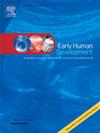早期认知/语言在儿童后期语言能力中的作用——一项纵向比较研究
IF 2
3区 医学
Q2 OBSTETRICS & GYNECOLOGY
引用次数: 0
摘要
背景:许多因素可能影响早期语言发展,但认知发展的确切影响尚不清楚。目的:本研究旨在探讨认知发展对语言能力的影响,并比较2、0岁幼儿早期认知和语言能力对3、6岁和5、0岁幼儿语言能力的解释价值。方法:对61例典型发育儿童进行随访。在2;0时,使用Bayley婴幼儿发展量表III测量认知发展,使用Reynell发展语言量表III测量语言能力。在3、6和5、0时,使用波士顿命名测试、芬兰语音韵学测试和芬兰语形态学测试来测量语言能力。结果:2;0时认知发展与3;6时语言能力显著相关(r = 0.15 ~ 0.35, p = 0.01 ~ 0.24), 5;0时无显著相关(r = 0.12 ~ 0.25, p = 0.05 ~ 0.36)。早期和晚期语言能力之间的关联在两个年龄点都很明显(r = 0.41-0.69, p <;美元)。0时认知发展的解释值为7 - 11% (p = 0.02 - 0.07),而后期一般语言能力的解释值分别为40 - 45% (p <;美元)。结论:这项纵向研究为早期认知和语言发展对后期语言能力的作用提供了新的比较信息。研究结果表明,语言发展在很大程度上取决于儿童时期的早期语言能力,而认知发展的作用似乎不那么直接。本文章由计算机程序翻译,如有差异,请以英文原文为准。
Role of early cognition/language in later language ability during childhood – A longitudinal comparison study
Background: Many factors may influence early language development, but the precise impact of cognitive development remains unclear.
Aims: This study aims to explore how cognitive development contributes to language ability and to compare the explanatory value of early cognitive and language ability at 2;0 (years;months) on the language ability at 3;6 and at 5;0.
Methods: Sixty-one typically developing children were followed up. At 2;0, cognitive development was measured using the Bayley Scales of Infant and Toddler Development III, and language ability was measured using the Reynell Developmental Language Scales III. At 3;6 and 5;0, language ability was measured using the Boston Naming Test, the Finnish Test of Phonology, and the Finnish Morphology Test.
Results: Cognitive development at 2;0 correlated significantly with language ability at 3;6 (r = 0.15–0.35, p = .01–0.24) but not at 5;0 (r = 0.12–0.25, p = .05–0.36). The associations between early and later language ability were clear at both age points (r = 0.41–0.69, p < .00). Explanatory value of cognitive development at 2;0 was 7–11 % (p = .02–0.07), while the respective values for later general language ability were 40–45 % (p < .00).
Conclusions: This longitudinal study provides novel comparison information on the role of early cognitive and language development in later language ability. Results suggest that language development is strongly based on early language ability during childhood, whereas the role of cognitive development seems less straightforward.
求助全文
通过发布文献求助,成功后即可免费获取论文全文。
去求助
来源期刊

Early human development
医学-妇产科学
CiteScore
4.40
自引率
4.00%
发文量
100
审稿时长
46 days
期刊介绍:
Established as an authoritative, highly cited voice on early human development, Early Human Development provides a unique opportunity for researchers and clinicians to bridge the communication gap between disciplines. Creating a forum for the productive exchange of ideas concerning early human growth and development, the journal publishes original research and clinical papers with particular emphasis on the continuum between fetal life and the perinatal period; aspects of postnatal growth influenced by early events; and the safeguarding of the quality of human survival.
The first comprehensive and interdisciplinary journal in this area of growing importance, Early Human Development offers pertinent contributions to the following subject areas:
Fetology; perinatology; pediatrics; growth and development; obstetrics; reproduction and fertility; epidemiology; behavioural sciences; nutrition and metabolism; teratology; neurology; brain biology; developmental psychology and screening.
 求助内容:
求助内容: 应助结果提醒方式:
应助结果提醒方式:


